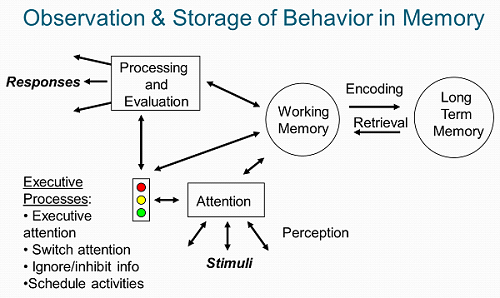When you walk in the room, who shows up for Read more →
The Problem with Your Personal Brand
Posted Tuesday, November 13, 2012Allen Slade
When you walk through the door, who shows up for the other people in the room? What image do people have of you? When I walk in, I would like to think that the “real” me shows up. Unfortunately, who actually shows up is an imperfect memory of me. Here’s a picture of the cognitive process of what people remember about you:
Bottom line: The problem with your personal brand is every step of cognition simplifies and distorts the memory of who you are. As Leonardo DiCaprio’s character in the movie Inception says: “But I can’t imagine you with all your complexity, all your perfection, all your imperfection.”
If only a partial image of the “real” you shows up when you walk in the room, you need a brand and a plan. You need a personal brand statement like this:
For [a specific person or group], I want to be known for [six adjectives] so I can deliver [valuable outcomes].
For example, here is part of my own personal brand statement:
For my leadership coaching clients, I bring powerful listening, insightful curiosity and straightforward knowledge to create maximum leadership presence, personal effectiveness and organizational success.
Here are some suggestions on how to craft your own personal brand statement:
Target your brand. You should have a targeted personal brand statement for each group or person you want to impact. For myself, I have three brand statements. You need at least two brand statements.
Be organized. Gather all the data about how others perceive you – performance reviews, personality profiles, 360 feedback, key emails, verbal impressions, etc. Then take at least four hours spread over several days to draft your personal brand statement. Here is a personal brand worksheet to help you get started on defining your own personal brand statement.
Be authentic. Make sure your personal brand is completely compatible with the real you. Being authentic moves your personal brand from false advertising to true marketing. If your personal brand promises what you can actually deliver, you and the people you serve will be happier.
Get feedback. Once you have a draft of your personal brand statement, share it with your circle of trusted advisors. Their reaction to your brand can help you test its authenticity and its value to the people you want to serve. Your circle of trusted advisors should include mentors, spiritual advisors and, ideally, a certified career coach, leadership coach or executive coach.
When you craft a personal brand statement, you help focus the impressions others hold about you. You open doors to new leadership and career opportunities. Then, when you walk in the room, “who shows up” for the other people is the authentically influential you.



Great article.
A trainer once suggested to put your own brand into three keys. Ideally one sentence each:
1. I am: …
2. I can: …
3. I want: …
Like:
I am Jens R. Woinowski, founder of Lean Self. I can show you the power of Lean Management for self-improvement. I want to empower YOU.
How do you like this brand message?